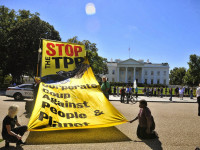This blog is normally limited to digital law and policy issues, such as privacy, copyright and the Internet. Not today. These are not normal times. The events in the United States over the past few days involving the creation of an executive order with a thinly-veiled Muslim ban demand a response. While some politicians have tried to avoid comment by arguing that this is an internal U.S. matter, the far-reaching implications for the world and for the millions of people whose lives are at stake does not allow for such an easy out. There may be a cost for speaking out – some have suggested that Prime Minister Justin Trudeau should avoid angering U.S. President Donald Trump – but if so, it is a price worth paying.
Archive for January, 2017
The Shattered Mirror, Part One: Fair Dealing Reform Isn’t the Answer for News in the Digital Age
The Public Policy Forum released its much anticipated report on the future of Canadian media yesterday. The Shattered Mirror: News, Democracy and Trust in the Digital Age garnered considerable attention and may influence policy discussions over what – if anything – to do about the struggling media industry. I tweeted some initial responses to the report and plan several posts to examine some of the recommendations more closely.
This post starts with one of the worst (if unsurprising) recommendations: copyright reform. For the better part of two decades, business sectors facing digital challenges invariably think that copyright law offers a solution. It rarely does and definitely does not in the case. In fact, the proposed copyright reform to fair dealing would cause considerable harm to freedom of expression and the practice of news reporting with little likelihood of economic benefit.
Trump’s Executive Order Eliminates Privacy Act Protections for Foreigners
President Donald Trump’s Executive Order on domestic safety, released yesterday, has enormous implications for the privacy of everyone living outside the United States. For Canadians, the order should raise significant concerns about government data shared with U.S. authorities as well as the collection of Canadian personal information by U.S. agencies. Given the close integration between U.S. and Canadian agencies – as well as the fact that Canadian Internet traffic frequently traverses into the U.S. – there are serious implications for Canadian privacy. Moreover, the order will raise major concerns in the European Union, creating the possibility of restrictions on data transfers as it seemingly kills the Privacy Shield compromise.
Section 14 of the Executive Order states:
Agencies shall, to the extent consistent with applicable law, ensure that their privacy policies exclude persons who are not United States citizens or lawful permanent residents from the protections of the Privacy Act regarding personally identifiable information.
The protection of Canadian information which ends up in U.S. hands has long been a source of concern. Professor Lisa Austin has written about “constitutional black holes” in which Canadian data is not protected by the Canadian Charter of Rights and Freedoms and the protection afforded to the data in the United States is at a lower standard than for its citizens and permanent residents.
The Trouble for Canadian Digital Policy in an ‘America First’ World
Canadian digital policy over the past decade has been marked by a “made-in-Canada” approach that ensures consistency with international law but reflects national values and norms. On a wide range issues – copyright rules, net neutrality, anti-spam legislation, and privacy protection among them – the federal government has carved out policies that are similar to those found elsewhere but with a more obvious emphasis on striking a balance that includes full consideration of the public interest.
My Globe and Mail opinion piece notes that as with many issues, the burning question for the Liberal government is whether the Canadian digital policy approach can survive the Donald Trump administration. Trade pressures are likely to present Canada with an enormous challenge in maintaining its traditional policy balancing act since the United States is already using tough talk to signal demands for change. This suggests that many Canadian policies will be up for negotiation, although there are some potential opportunities that reside outside of the trade talk spotlight.
As Trump Pulls the U.S. Out of the TPP, Canada Should Follow Suit
In one of his first acts in office, U.S. President Donald Trump has signed an executive order withdrawing the United States from the Trans Pacific Partnership. With the U.S. out of the TPP, the agreement cannot take effect as it requires ratification from both the U.S. and Japan to do so. Last week, new International Trade Minister Francois-Philippe Champagne said that Canada would consider all its options with the remaining TPP countries, but the reality is that Canada should follow the U.S. lead and abandon the agreement.
The need for U.S. and Japanese ratification for the TPP to take effect is no accident. For most of the countries in the TPP, access to those two markets were the reason they were willing to sign in the first place. For example, Canada came late to the TPP negotiations in part because it saw limited value in better access to markets such as Australia, Vietnam, Malaysia, and New Zealand. Trade with those countries is relatively minor and would not justify making significant policy concessions. The decision to join the negotiations was sparked by concern that preferential access to the U.S. would be undermined if Canada was left out of the TPP and by a desire to strike a trade agreement with Japan. Once Japan shifted its focus from bi-lateral discussions to the TPP, Canada pushed for inclusion in the deal. With the U.S. out, one of the foundational arguments for joining the TPP is gone.








![Red alert -[ HMM ]- by Carbon Arc CC BY-NC-SA 2.0 https://flic.kr/p/FgBkhR](https://www.michaelgeist.ca/wp-content/uploads/2024/10/25774555205_035a814280_k-100x75.jpg)


